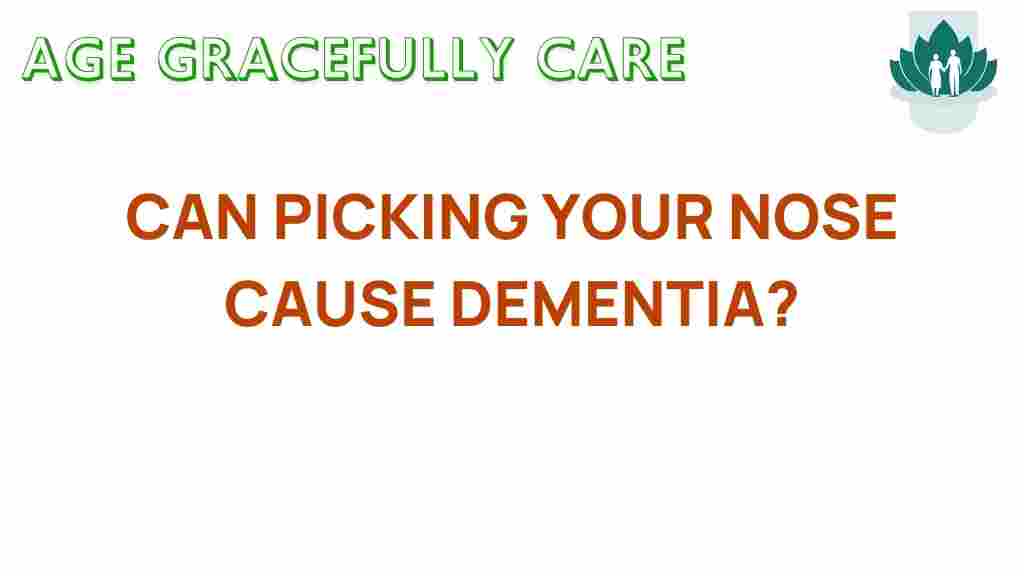Can Picking Your Nose Lead to Dementia? The Surprising Connection
Nose picking is often regarded as a socially unacceptable habit, but it might not just be a matter of etiquette. Recent discussions have emerged around the potential health risks associated with this common behavior, particularly its surprising connection to dementia and other neurodegenerative diseases. In this article, we will explore the implications of nose picking on brain health, hygiene, and cognitive decline, while also providing insights and tips for maintaining personal care.
The Relationship Between Nose Picking and Brain Health
The act of nose picking may seem innocuous, but it carries certain risks that can impact your health. Let’s delve into how this habit could potentially affect your brain health and contribute to cognitive decline.
- Infection Risks: Picking your nose can introduce harmful bacteria and viruses into your nasal cavity. The nose serves as a barrier to pathogens, and disturbing this area can lead to infections.
- Inflammation: Repeated trauma to the nasal passages can result in chronic inflammation, which is known to affect overall brain health and has been associated with neurodegenerative diseases.
- Direct Pathways to the Brain: The olfactory bulb, responsible for the sense of smell, has direct connections to the brain. Any disruption or infection in this area could potentially lead to neurological consequences.
Understanding Dementia and Neurodegenerative Diseases
Dementia encompasses a range of symptoms associated with cognitive decline, affecting memory, thinking, and social abilities significantly enough to interfere with daily life. Neurodegenerative diseases such as Alzheimer’s and Parkinson’s are among the most common forms of dementia.
Research has shown that various factors contribute to the risk of developing these diseases:
- Genetics: Family history can play a significant role in the likelihood of developing dementia.
- Lifestyle Choices: Diet, exercise, and mental engagement are critical for maintaining cognitive function.
- Hygiene Practices: Maintaining optimal hygiene can reduce the risk of infections, which might indirectly influence brain health.
How Nose Picking Fits into the Puzzle
While the link between nose picking and dementia may not be direct or widely studied, it is essential to consider how seemingly trivial behaviors can impact overall health. Here are some potential pathways:
- Introducing Pathogens: Picking your nose can introduce pathogens that may lead to infections, which have been linked to inflammation and cognitive decline.
- Behavioral Patterns: Individuals who engage in frequent nose picking may also neglect other aspects of personal care, leading to a cumulative effect on their health.
- Chronic Inflammation: Continued trauma to the nasal passages may lead to chronic inflammation, which has been associated with various neurodegenerative conditions.
Step-by-Step Process to Maintain Hygiene and Brain Health
To minimize the health risks associated with nose picking and promote better brain health, consider the following steps:
Step 1: Understand the Importance of Hygiene
Maintaining good hygiene is crucial for overall health. Here are some tips:
- Wash Your Hands Regularly: Frequent handwashing can significantly reduce the spread of germs.
- Use Tissues: If you need to clear your nose, use a tissue instead of your fingers.
- Moisturize Nasal Passages: Keeping your nasal passages moist can reduce the urge to pick your nose.
Step 2: Identify Triggers for Nose Picking
Understanding what prompts you to pick your nose can help you mitigate the behavior:
- Allergies: If allergies are causing nasal discomfort, consider consulting a healthcare professional for appropriate treatments.
- Dry Air: Using a humidifier in dry conditions can help keep your nasal passages moist and reduce the urge to pick.
- Stress or Anxiety: If nose picking is a stress response, explore relaxation techniques such as meditation or deep-breathing exercises.
Step 3: Implement Healthy Alternatives
Finding alternatives to nose picking can help redirect the habit:
- Use Nasal Sprays: Saline nasal sprays can help keep the nasal passages clear and moist.
- Practice Mindfulness: Being aware of your habits can help you recognize when you are about to pick your nose and redirect your focus.
- Engage in Other Activities: Keeping your hands busy with fidget toys or other activities can reduce the urge to pick.
Troubleshooting Tips for Nose Picking
If you find it challenging to stop nose picking, consider these troubleshooting tips:
- Track Your Behavior: Keep a journal to note when and why you pick your nose.
- Set Reminders: Place reminders around your home or workspace to discourage the habit.
- Seek Support: Talk to friends or family about your desire to change this habit; they can help keep you accountable.
Conclusion: The Broader Implications of Nose Picking
While the idea that nose picking could lead to dementia might seem far-fetched, it is crucial to recognize the broader implications of personal hygiene and health habits. Maintaining good hygiene, understanding the risks associated with certain behaviors, and making conscious choices about our health can contribute to better brain health and potentially reduce the risk of neurodegenerative diseases.
As we continue to learn more about the connections between lifestyle choices and cognitive health, it’s essential to remain vigilant about our habits. For more information on maintaining brain health and the latest research on neurodegenerative diseases, check out this comprehensive resource.
In conclusion, while nose picking may seem harmless, it is intertwined with larger issues of health and hygiene. By taking proactive steps to manage this habit, we can contribute to our overall well-being and promote a healthier future.
This article is in the category Health and created by AgeGracefullyCare Team
